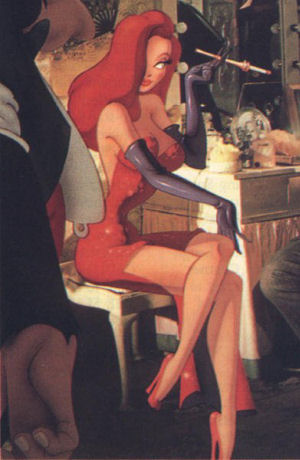

On the left is a picture of my German grandmother, on the right is an image from my Jubilee Edition of Grimm's Fairy Tales, three volumes in Gothic script, which I got when I was still quite young, but didn't actually read through till I was at university, when I read them all in quite a scientific way, noting the repetition of key motifs and mentally grouping them into 'story-sets'. Something I recently heard Sue Price say she had done too! I love the image, it is of course the story-telling grandmother, an old peasant woman, and it's replete with German romanticism. Looking at it now, though, I realise that since half my ancestors were German, Polish and Austrian peasants, it is like a picture of one of them. And I do see some similarity between it and my own grandmother's image, though I've always also seem a resemblance to Virginia Woolf, who, like Omi, had a severe psychological illness.
It was she who first told me Grimm's fairytales, in German - my favourite was the Wolf and the Seven Little Goats, and I still have in my mind the vivid picture I formed then of the wolf, his face covered with chalk, erupting into the middle of the terrified little kids, chasing them round and gobbling most of them up - except for the smallest, who I understood to be me - who hid in the cupboard. Interesting that I never tried to imagine what it might be like for the others inside the wolf, who were later scissored out of him while he slept off his feast. (I did later spend quite a lot of time imagining Jonah's life inside the belly of the whale.) The story plays, in my mind, against the background of the darkness of my bedroom. Omi used to sleep on the same floor as my brother and me, in the attic of our house in Kendal, and if I wanted to go down the scary stairs to the loo in the middle of the night, I'd wake her up, because she was always patient, and then demand that she told me this story. It never scared me, nor did any of the other Grimm stories. It was safely stitched up (like the stones in the wolf's belly) in the world of story. Whereas the ghosts and murderers my big brother had told me infested the stairs at night were indistinct, unconfined by any narrative, and therefore incredibly menacing. As was the roaring lion who lived in the flush - another story of my brother's.
I can hear Omi's voice in my head now, gentle, rather silvery, actually very beautiful, but I didn't categorise her voice like that. She told me Red Riding Hood (another scissored-open wolf), and Hansel and Gretel, Cinderella - oh, that sister cutting the heel off her foot - and various other gruesome narratives - odd for her, who was so gentle that she literally couldn't hurt a fly, I remember seeing her watch one, saying 'Such a tiny being.' She was a vegetarian because she didn't want animals to die to keep her alive. The other stories she told me I was less interested in, like the Heiligejungfraumaria, (Blessedvirginmary) who she went to visit in church, a plaster lady with a bland face, though I did, to do Omi the favour, take my new/old doll (my mother's before me) to show Mary when I got her for my third birthday. I didn't much like the Jesus my Dad was so keen on either, though I believed in God. I preferred the Divine to be unpictured, and I still do.
That last is a digression, but not totally, because, coming back to those stories told in the dark, where my imagination made the pictures, I'm really glad I heard Grimm in that way, in the oral tradition, heiress to the policing of generations of children who must have said: 'No, it goes like this - you've left out the bit about hiding in the cupboard - what about the chalk, Omi?' And so on.






















